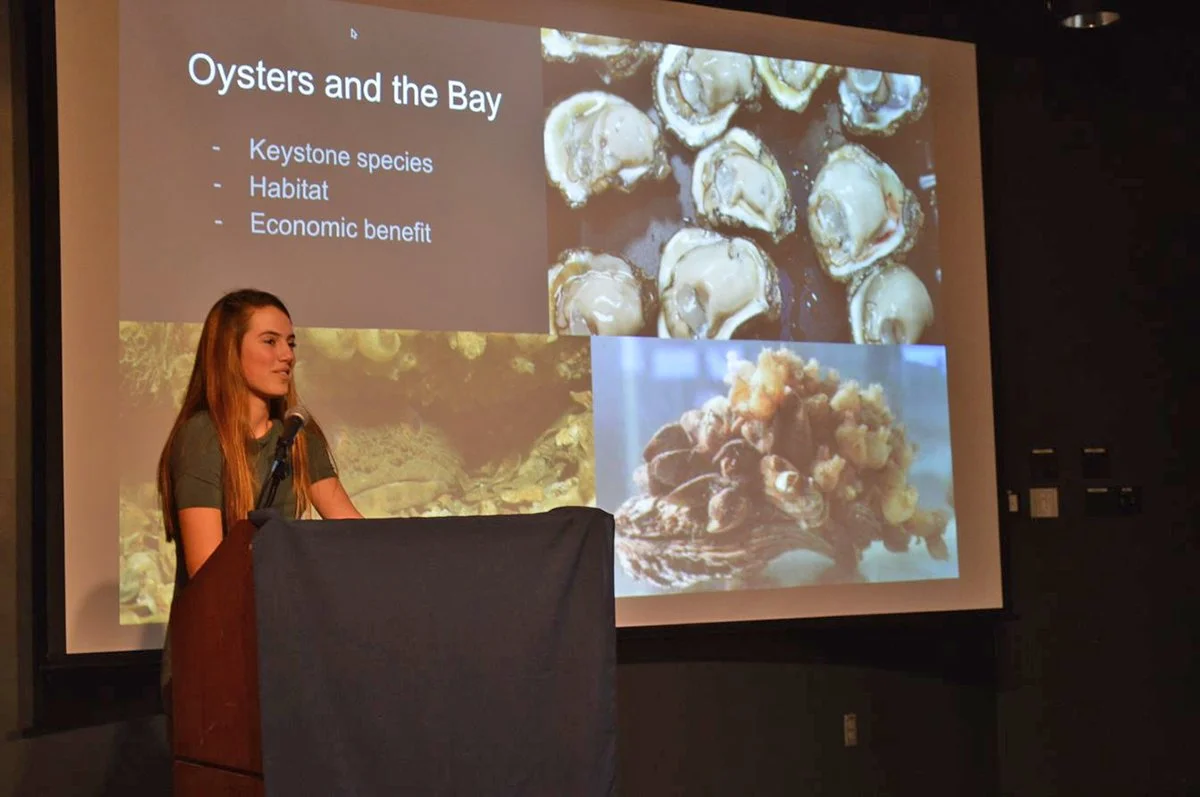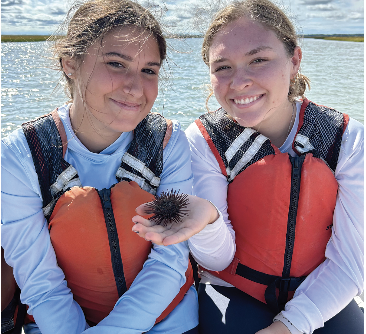
Capstone Research Projects
The hallmark of the Chesapeake Watershed Semester is the cross-disciplinary research project that each student completes. Students work with teachers and mentors from the community to design their research topic, and then engage in a deeply rigorous research process. Part of the research process includes reaching out to experts in the community, so the students can achieve an ‘on-the-ground’ perspective on their research project. The interviews with mentors deepen students’ understanding of the field of study and push them to think about their topic in new ways. For students over the course of the Chesapeake Watershed Semester, as research topics develop and questions become clarified, the capstone project evolves into a passionate exploration of the topic that inflects how many students think about their college careers and beyond.
The final product includes a deeply researched paper and the public presentation of the research work. Recent Capstone Research Projects have explored:
Deforestation’s impact on the Chesapeake Bay
Oyster aquaculture research
Eco-Arts Impact on Human Views of the Environment
The Impact of Population Growth & Urbanization on the Chesapeake Bay
How the Maritime Industry has Changed the Bay
Cultural Conceptions of Climate Change on the Islands of the Chesapeake
Potomac Horse Fever & Climate Change
Lost Islands of the Chesapeake
The Importance of Sharks in the Chesapeake Bay
The History & Predicaments of Chesapeake Bay Watermen
The Musical Tradition of the Chesapeake
The Influence of Menhaden in the Chesapeake Estuary
Thomas C. CWS’23
Thomas is currently studying at the Maine Maritime Academy.
Maritime Transportation in the Chesapeake Bay
Thomas, a maritime enthusiast, chose to research shipping in the Chesapeake Bay. Thomas shared all kinds of interesting data about the importance of the Ports of Norfolk and Baltimore and about the shipping channels that massive cargo ships use to make their way up the Bay. He uncovered that there are an array of environmental concerns in relation to shipping. In particular, he shared about noise pollution, air pollution, habitat destruction, and the spread of invasive species through ballast water. Thomas was able to take advantage of this project by diving into a topic that he knew he wanted to pursue in his future academic and professional life. What a way to kick off the beginning of his next journey!
“One thing I learned a lot about, and found really interesting, is the sound pollution that comes off ships. I knew all ships gave off sounds, but I never thought they were an environmental impact. I learned that sounds can affect a lot of the functions and daily habits of marine life,” said Thomas.
Jessica H., CWS ’22
Environmental Justice and the Chesapeake Watershed
Jessica is currently studying at the University of Colorado-Boulder.
Jessica completed her capstone project on the topic of environmental justice, doing a deep dive to understand what environmental injustice and justice looks like in our watershed. She had the opportunity to speak with three professionals including a journalist, an environmental nonprofit employee, and a lawyer, learning about the issues impacting the Bay and its surrounding communities.
Specifically, she discovered how these issues vary greatly between urban and rural places in the watershed. This project proved to be very impactful for Jessica who has long been environmentally active at Gunston and in the larger community, serving on the Environmental Club and as a student leader at the Upper Shore Youth Environmental Action Summit for two years running. Jessica also recently received the Girl Scout’s Gold Award for her work designing and installing environmental awareness signs in a local community park.
“I learned this is a field that I am interested in and passionate about. And for me the best way to help the environment might be to stay on the policy side,” said Jessica.
Allison D., CWS ’23
Potomac Horse Fever and Climate Change
Allison is currently studying at the University of Maryland
Allison, an equestrian and enthusiast for the outdoors, chose to do her capstone project about Potomac Horse Fever (PHF). PHF is an equine disease that was first discovered in our watershed. PHF is caused by the bacteria Neorickettsia risticii which implants itself onto aquatic insects. When horses drink from infested waters, they are at risk of ingesting an insect that is carrying the bacteria. If so, the horse could develop colitis and other digestive issues. In completing research on this topic, Allison learned that the life cycle of N. risticii relies on warm water temperatures. As a result, Allison was able to draw some really interesting conclusions about how rates of warming brought on by climate change might result in higher rates of Potomac Horse Fever. For this project, she interacted with a number of veterinary professionals who shared their own knowledge and experience with the disease.
“I have learned a lot about how to move forward in writing an in-depth research paper. Deciding on a topic, all the research it takes, writing, revising, and then presenting. My capstone project has taught me to be confident in my writing, time management, and better public speaking skills, which I will take with me throughout my career past Gunston,” said Allison.



